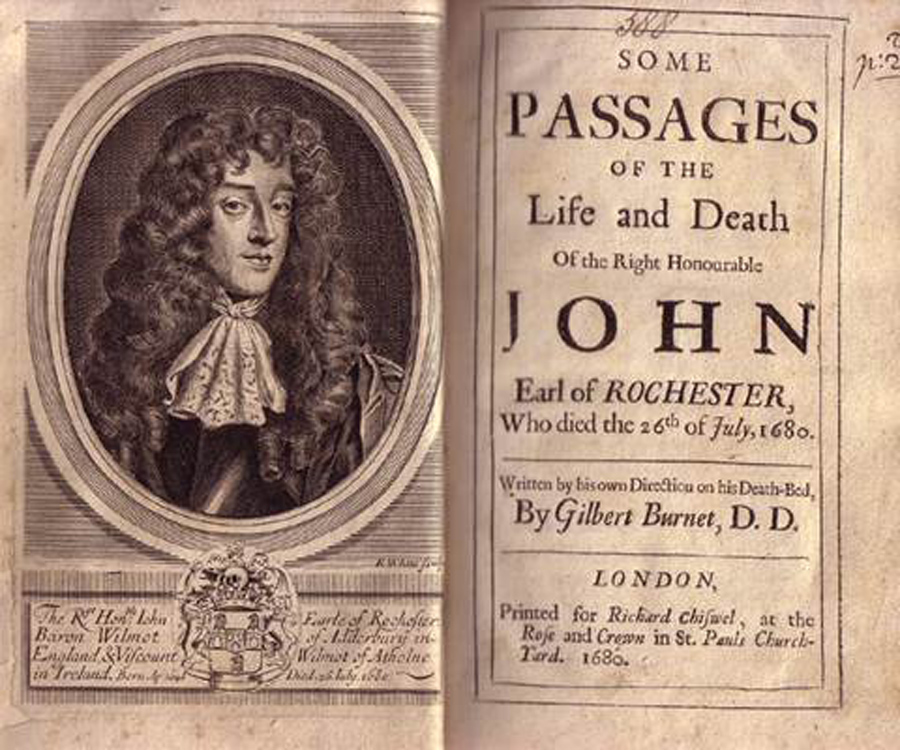If you were asked to recall an English poet famed for his excesses and his bad behavior, you would probably think of Byron. A few might instead choose Coleridge and his opium, drunk by the pint. Both artists survive for posterity on the strength of their poetry, as much as their reputation.
But there is a story of another English poet who was quite too much into women, wine, and drugs. He was debauched enough to earn a bad reputation, and he lived and died a hundred years before Byron or Coleridge were born. He was, perhaps, the great libertine of the age.
John Wilmot, or Lord Rochester, was a popular English poet and the courtier of the restoration court of King Charles II. The King, returned to rule in 1660 after the execution of his father in 1649 (hence “restoration”) was in something of a party mood.
Charles led the country in embracing a new freedom, reacting against the Puritanical restrictions which had corseted the country for decades. Rochester was only to happy to join his King in this new wave of excess, earning himself a name for his rakish lifestyle, and his poetry, in that order.
He burned through his life at a rapid pace, dying at only 33 due to some venereal disease. But the impression that he built over these 33 years of his life shines brightly to this day. Was he truly as bad as everyone said he was?
John Wilmot, 2nd Earl of Rochester
The Earl of Rochester or Lord Rochester was certainly a notorious figure at the court of Charles II in the 1660s and 1670s. He was handsome and a talented poet.

But it is telling that, somewhat like Byron, posterity has focused on his misdeeds and not his poetry. This is certainly the direction the movie made of his life, starring Johnny Depp (of course), took, where his poetry is only seen in a few scenes, and where the stories of his misbehavior take center stage.
But still, the movie depicted a fairly accurate vision of how Lord Rochester was! As per the information and verdicts available from the time, the conclusion is that John Wilmot was committed to the mindset of “live fast and die young”.
- The Duke of Buckingham: Was Dumas’s Hero also James I’s Lover?
- Who Was Aleister Crowley…Occultist, Satanist, and British Spy?
The good-looking Lord Rochester was fond of wild parties and loose women, and men. It was said that his favorite debauchery was all of them. Sex, drugs, and alcohol were his best friends. Hence, this is the impression that he created and wanted people to see.
He was arrested multiple times, and even imprisoned by the King in the Tower of London. Having been send abroad for trying to kidnap a woman for her fortune, he promptly eloped with her and married her on his return. And he was said to have been drunk continually for five years, while at court with his “Merry Gang” of friends.
Where Did This Come From?
Is there any clue to his behavior in his upbringing? John Wilmot, was born on April 1, 1647. His father, Henry, was a loyal monarchist supporter of King Charles II who was then in exile. When the King was restored in 1660, Rochester’s father received a peerage as a reward for this loyalty. The family of the young Rochester was in high esteem at court
His marriage may have been a scandal in itself, but Rochester was certainly not faithful and had many mistresses. Amongst those names were the actress Nell Gwyn, later the mistress of Charles II, and the acclaimed stage actress Elizabeth Barry. Both these mistresses were considered amongst the renowned beauties of their time.
The mother of John Wilmot, Anne St. John, was of quite a stubborn and had an intimidating personality. And she always tended to encourage the signature boldness of her son.
Rochester also inherited the vivacity of his father, a fighting legend of King Charles I’s cavaliers and a war hero. Rochester’s bravery was also unquestioned, having served in the Royal Navy in active combat and returning a war hero himself.
Could it be this combination of boldness and charm which encouraged Rochester to behave as he did? When John was 11 years old, his father passed away, and John inherited the title as “Second Earl of Rochester.” It is said that right after John received his Earldom, he started gaining his infamous reputation.
He was one of the wildest people at court, but he was not always there as the King, tiring of his behavior, would send him away. Most of his adult life was passed by attaining a balance between quiet country living and enjoying the city temptations of London.
- Chevalier D’Eon: Soldier, Diplomat, Spy… Woman?
- Marguerite Alibert: Courtesan, Murderess and Blackmailer of a King
Rochester led his circle of friends on a debauched dance through London and court society for fifteen years. They showcased their rowdy nature and left many who came into contact with them damaged, both physically and mentally, in pursuit of wine, women and song.
A Talent for Writing
Even though Rochester was certainly a debauched man with a bad reputation, he had rare writing talent. He had a good reputation for being extremely witty and sharp at the Restoration court, a talent them held in high regard. He was even given the title “The Best English Satirist” by Andrew Marvell, who was a great English poet: high praise indeed.

What got him into trouble was the content of his poetry. Most of his poems were censored during the Victorian era, the more buttoned up Victorians refusing to allow his smut into public society. But, from 1920 his poems were again made available to read, which led to some reappraisals from various literary figures.
Rochester’s reputation as a poet is somewhat damaged by the fact that much of his work was unpublished. He did not need the money, and much of his poetry was impromptu, mixed into his conversation or for private amusement.
Something of the polished poet in Rochester can be seen from his best published work: A Satyr Against Reason and Mankind. Unsurprisingly, the poem offers some sophisticated arguments against rationalism and in favor of excess. It is at once deceptive, self-serving, and enticing.
The Libertine
With this death at the age of 33, from a combination of alcoholism and disease, Rochester had come full circle. He had consumed much in his life, and in turn his life consumed him.
Leaving behind an enormous reputation and a limited body of work, it is easy to see why history remembers him as this rake, a libertine interested only in excess. Careless with his reputation, the image that formed around him was more factual than carefully crafted.
And it is easy to see that this reputation is well founded. Byron may have been naughtier, but he was also careful to make sure history remembered what a good poet he was. Was Rochester the better poet? Sadly we cannot say.
But was Rochester a naughty man? Most assuredly he was.
Top Image: Rochester’s reputation survives him to this day. Source: LIGHTFIELD STUDIOS / Adobe Stock.
By Bipin Dimri